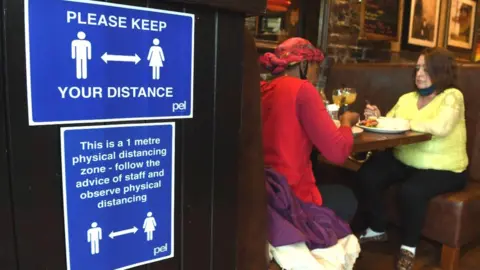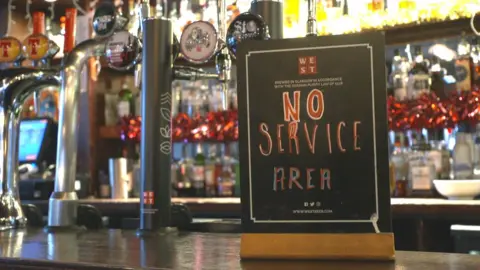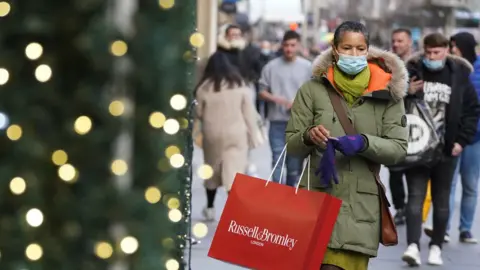Covid in Scotland: Large events banned as Omicron restrictions begin
 Getty Images
Getty ImagesNew rules aimed at slowing transmission of the Omicron variant have come into force in Scotland, meaning all large public events have been cancelled.
The limits on the size of events were announced last week but came into force at 05:00 on Sunday.
However, many concerts, theatre shows and pantomimes were already cancelled ahead of the restrictions.
Boxing Day football matches in the Scotland's top flight will be played in front of a maximum of 500 seated fans.
At the Celtic V St Johnstone match at McDiarmid Park, police said they dispersed a "small" group of fans who had gathered outside the Perth stadium.
After Sunday's fixtures, the SPFL (Scottish Professional Football League) will then bring forward its winter break and fixtures will not resume until 17 January.
It said it was "very hopeful" capacity crowds could return to matches after the three-week cap on attendances over the festive period.
Attendance at all live public events for the next three weeks is limited to:
- 100 people for indoor standing events
- 200 people for indoor seated events
- 500 people for all outdoor events (seated or standing)
This effectively cancelled large Hogmanay parties including Edinburgh's Hogmanay.
The restrictions do not apply to private life events such as weddings.
Further restrictions prevent adult non-professional contact sports - such as five-a-side football - in indoor spaces.
 Getty Images
Getty ImagesOther measures announced by the first minister on Tuesday will take effect from 05:00 on Monday 27 December.
They include a return to 1m physical distancing in all hospitality and indoor leisure settings, which includes pubs, restaurants, gyms, theatres and museums.
Table service must also be used in places where alcohol is served to drink on the premises.
Nightclubs also have to close for a period of at least three weeks, though they can stay open if they operate as a pub with table service and distancing.
All of the measures will be reviewed after three weeks on Tuesday 11 January.
The new restrictions follow rising Covid case numbers fuelled by the new Omicron variant.
The most recent figures, released on Christmas Eve, showed 7,076 new cases of Covid-19, the highest daily total since August.
The figures also showed 10 deaths and a 14.7% positivity rate.
'Get boosted by the bells'
The Scottish government's health secretary, Humza Yousaf, said the new measures were proportionate, but acknowledged that they would have an impact on businesses.
He said the Scottish government had put in place a £375m support package for business.
"I can completely understand why people are scunnered and sick and tired of the protective measures and restrictions we bring in.
"But science is helping us," he added, asking everyone to get booked in for their booster appointment as soon as possible.
He said there were "plenty" of appointments available for 27 December onwards.
"Get yourself boosted by the bells," he said, noting that without vaccines the situation would be far worse - and much tougher curbs would be needed.
The Scottish government urged people should stay home as much as possible to limit the number of contacts they have and to gather in groups of no more than three households.
Wales and Northern Ireland have also implemented further restrictions on the hospitality and leisure industry, resumed social distancing rules and put limits on the size of gatherings. No further restrictions have been implemented in England.

Hospitality businesses were preparing for the change in operating procedures on Monday.
In Glasgow, staff at Hootenanny on Howard Street were getting ready to return to measures last used in the summer.
Manager Andy Fairgrieve told the BBC: "We're going back to full table service like we were in the summer. So basically no one is allowed to come to the bar counter. No one is allowed to walk about with food or drinks."
He said that procedures for table service and physical distancing were already in place.
"All the staff know what they are doing, so it is quite easy going back. But the thing about the summer was people didn't mid sitting outside and using the space there. I am not sure how keen people will be in the middle of January to sit outside and have a beer and some food."
He said a quiet January on top of a December of cancelled parties and people not going out would take its toll financially.
"I just hope people will still come out," he added.

Omicron: What we know so far
 PA Media
PA Media- This variant is very contagious - it spreads faster than others and can infect people even if they are fully vaccinated
- Vaccines and boosters are still essential - they do a great job at protecting against severe disease that could put you in hospital
- It is milder - if you catch it, the risk of needing hospital treatment is up to 70% lower than with previous variants - but that is largely because many of us have built up immunity from vaccines and past infections rather than changes to the virus
- Even if Omicron is milder, because it is more contagious a large number of people will catch it and some will still become very ill, which puts pressure on the NHS



